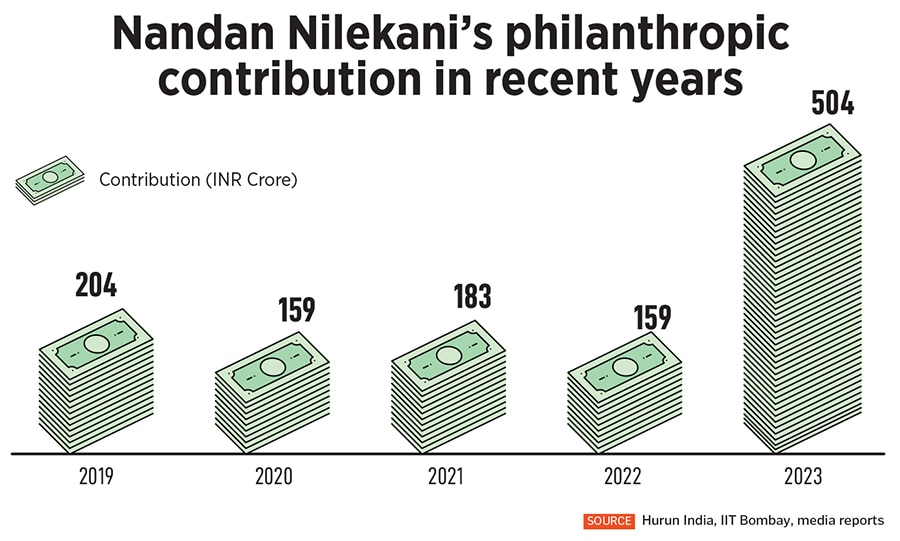Nandan Nilekani: Paying it forward, at scale
Infosys cofounder and IT billionaire is pouring his personal wealth into development ventures with no certainty of success, but which could become game changers for India


Last June, Nandan Nilekani marked the 50th year of his association with the Indian Institute of Technology (IIT) Bombay, where he earned a degree in electrical engineering, with a grant of ₹315 crore.
This was only the latest in the IT entrepreneur’s philanthropic investments, which, alongside wife Rohini, go back several years, supporting social development projects in India.
“I’m grateful to give forward," Nilekani said in a short press statement released by the institute. He had previously given ₹85 crore to it. Over the years, the Nilekanis have given thousands of crores of rupees to philanthropic causes, primarily in social development and education.
In 2017, both also promised to give away a majority of their wealth, as signatories to The Giving Pledge, started in 2010 by billionaire investor Warren Buffett, Microsoft founder Bill Gates and his then-wife Melinda French Gates.
In their pledge letter, the Nilekanis quoted the famous verse 47 of chapter 2 of the Bhagavad Gita, which starts as ‘Karmanyevadhikaraste maphaleshu kadachana’ to say they aimed to exercise their right to work (for good) without seeking to benefit from the fruits of their efforts.
What is noteworthy about Nilekani’s “strategic philanthropy" as he described it in a note to Forbes India is that he’s chasing an idea that he has evangelised for a long time—impact at scale.
For the long read, Nilekani’s influential book, Imagining India—first published in 2009 and then revised in 2021—offers a deep dive into how he looks at the country. For a quick primer, a 15-minute TED talk he gave around the same time that his book was published summarises the ideas and motivations that have driven Nilekani’s investments.

In short, he aims to back efforts, with digital tech underpinnings, that can make a difference at the billion-people scale.
An important initiative backed by him, Rohini, along with entrepreneur Shankar Maruwada—who previously worked with Nilekani at the Unique ID Authority of India—is EkStep, which is tackling the lack of access to education for many in India.
EkStep is “working to improve literacy and numeracy and addressing this challenge at scale", according to its website.
Today, its various components include SunBird, an open source, configurable and modular digital infrastructure, Societal Platform, People+AI (also referred to as PeoplePlus), Onest and Bachpan Manao.
SunBird is designed for scale and open sourced under MIT licence. Its open digital infrastructure supports multiple languages and teaching and learning solutions to suit different contexts and needs. It’s used by governments, non-profits and private entities.
It provides a toolbox of building blocks that have been used in initiatives like Diksha, the flagship school education programme of the government of India, and Suvas, an initiative by the Supreme Court of India, according to the latest report by the Digital Public Goods Alliance. EkStep Foundation joined the alliance in 2023.
EkStep also curates Societal Platform which works on the thesis that for solutions to work at scale, their design must support problem solving. And “meet a problem at the scale that it is", Maruwada said in an interview with Moneycontrol last July.
The attempt is to get civil society, governments and the private sector to make meaningful decisions for the collective wellbeing, catalyse interactions, build public goods and orchestrate sharing of resources, according to EkStep’s website.

When EkStep Foundation was set up in 2014-15, one of the earliest questions they asked was how to improve learning outcomes for some 200 million schoolchildren, Maruwada recalled in the interview. Today, one of the solutions EkStep developed uses QR codes in textbooks that when scanned, take students to relevant digital content.
Onest, launched in 2023, aims to provide equitable access to learning experiences and livelihood opportunities. The network is live with financial support initiatives for specific groups such as children of auto-drivers and delivery agents, according to the Digital Public Goods report.
Bachpan Manao Badhte Jao’s objective is to “incubate digital public goods that generate a societal-level narrative for early childhood and foundational years", according to the report. It involves creating, curating, and sharing resources, knowledge, and tools as public goods.
In 2024, EkStep Foundation will step up efforts to create a digital public goods tech enabler ecosystem, onboarding artificial intelligence (AI) advances to SunBird, and scale Onest, according to the report.
“The best thing about philanthropy is that it’s an extreme form of risk capital. When it’s your own money, you can take big risks with it," Nilekani had said in an interview with Dasra India, a non-profit organisation, in March 2021. Philanthropists can fund projects that governments or businesses can’t because of the high risk of failure involved, he added.
Today, “India has seen a significant rise in strategic philanthropy, moving beyond traditional charitable giving to more structured and impact-oriented approaches," Nilekani writes in his note to Forbes India (see interview). That said there is scope to provide more risk capital for social development to support innovation with technology for social good, he said.
First Published: Feb 05, 2024, 12:14
Subscribe Now